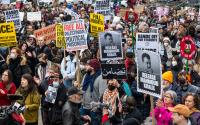30 December 2004Guardian
Stefan Johansson, a 41-year-old air force officer from Sweden, is hoping that tonight is the night. He is not concerned about aftershocks hitting the beach half a mile from here, or about the haphazard rescue operation finally under way in southern Thailand.
Nor is he worried by the deaths of several hundred compatriots. Mr Johansson is anxious that the bar girl he has his eye on is going to keep holding out on him. "I'm having a good holiday," he said. "I went for a walk along the sand this morning, did a bit of swimming. Now I'm off drinking, and then we'll see."
Mr Johansson is not alone. Four days after the tidal wave hit, normal life has returned to much of Phuket and surrounding resorts such as Patong. The "girlie" bars are reopening, the bazaars selling rip-off Rolex watches are busy, the tourists are streaming off flights and on to the beach. Here Thai prime minister Thaksin Shinawatra's request for the country to wear black and forego New Year festivities seems likely to fall on deaf ears.
"I heard what was going on with the wave and so on, and I just thought it was a bit of an exaggeration," said Peter Anstiss, 48, from Sydney, as he shared a beer with his brother in a bar off Patong beach's main drag. "I didn't think too much about it."
At Phuket's airport, Pornthip Sucharitcharan was preparing to welcome 200 new arrivals on behalf of the Phuket Hilton. Today another 200 guests will fly in to stay at the hotel.
The only problem, as far as Mr Sucharitcharan was concerned, were delays caused to commercial passenger flights by the unprecedented number of aircraft landing at the airport. The congestion is due to aid flights coming in and planes bearing the dead, injured and badly shaken out.
The search, rescue and humanitarian relief operation in southern Thailand has finally moved beyond the immediate vicinity of the largest tourists centres. The Thai military yesterday started using heavy earth-moving equipment at Khao Lak, 60 miles north of Phuket, on a series of ruined resort hotels where large numbers of victims are believed to be under the rubble.
Survivors have criticised the slow pace of the rescue operation. Ricardo Cavallo's young daughter was torn from his wife's arms as the couple ran from the wave. Mr Cavallo, from Portugal, has spent the last three days searching for her body in the rubble of a resort at Khao Lak. "For the first two days it was just me and some staff from our hotel with our bare hands. The authorities were nowhere to be seen," he said.
Colonel Arun Khaewwathi, heading the rescue effort in Takua Pa province to the north of Phuket, said that work was being hampered by a shortage of equipment, heat and the fear of aftershocks.
German, Swedish and Taiwanese specialist teams have now arrived. However, the death toll in Thailand continues to rise - to 1,657 with at least 1,500 missing. The dead include 473 foreigners, including up to 43 Britons.
But no one knows the true number of dead. Thousands of locals are thought to have been killed when their flimsy bamboo homes were destroyed.
Many remote fishing villages are yet to be reached though reports indicate severe damage. There is also little hard information on the effect of the tidal wave on islands to the south of Phuket.
Yet the luxury Royal Lighthouse Villas is booked up for the rest of the season, and has had no cancellations following the disaster. And the sprawling Diamond Cliff Resort, set on a bluff directly above Phuket's debris-strewn Patong beach, welcomed 136 new guests yesterday.
One new arrival at the Diamond Cliff, who flew in with her family from Moscow on Tuesday, relaxed on a lounger beside the pool. "We are here on holiday, not to be sad," she said. "I know bad things have happened, but it's nothing to do with us."
With many beaches still covered in debris, and corpses still being brought in by the tide, most tourists are staying in their hotels. And though many of those in Phuket when the tidal wave struck have left, others are seeing out the rest of their holiday.
Last night Sally Capuvanno, 39, from Leeds, was heading off for her first night out of her hotel since the disaster. "We have been cocooned here. You'd never know it had happened. Now it's all getting back to normal," she said.
Others at her resort, only 100 metres from the water's edge, said they had heard nothing as they lay by the pool when the tidal wave struck.
In Phuket's marina yesterday, yachtsmen were refitting damaged boats. Few had any intention of giving up long-held ambitions to sail around the Thai islands. "We will head on in a few weeks once we have got everything sorted out," said David Kennedy, a 45-year-old Londoner.
Back in Patong, Elliot Reid, from Melbourne, was finishing his gin and tonic. "I heard the warning from the government not to go to Phuket and just thought, fuck 'em," he said.
"At the end of the day, if your number's up, your number's up. By the time the next one happens in a hundred years, I'll be dead."
Tourism: a thriving business
Maldives
· Tourism is the largest industry for the 300,000 people who live on the 1,190 coral islands that make up the Maldives. It accounts for 20% of GDP and more than 60% of the Maldives' foreign exchange receipts. Over 90% of government tax revenue comes from import duties and tourism-related taxes.
· Last year the Maldives attracted half a million tourists for the first time, 100,000 of them British.
· Since the first resort was established in 1972, more than 90 islands have been developed.
Thailand
· There were 10 million visitors to Thailand in 2003, a fall of 7.4% from 2002 (due to Sars and the Iraq war). Tourism for 2004 is expected to rise to around 12m.
· Revenue from tourism in 2002 topped 300bn baht (£3.8bn), around 6% of the GDP.
· Most of Thailand's tourists arrive from East Asia (5.8 million in 2003) and Europe (2.5 million).
· Although independent travellers are more common, package tour visitors made up 45.6% of tourists in 2002, an increase of 3.5%. Revenue from tourism in 2002 was £3.8bn in 2002.
Sri Lanka
· Sri Lanka has experienced a mini boom in tourism, thanks mainly to the ceasefire between the Tamil Tigers and the government.
· Half a million visitors arrived in 2003, most of them British. The so-called peace dividend, coupled with tourist traffic from those avoiding Bali or Kenya after bombings there, earns the Sri Lankan government around a £271m a year.
http://www.guardian.co.uk/print/0,3858,5093383-115399,00.html






